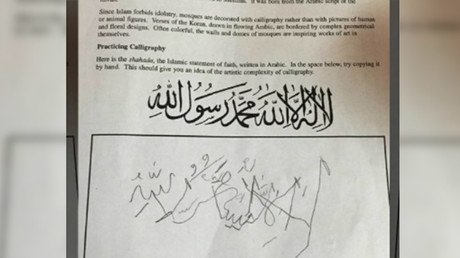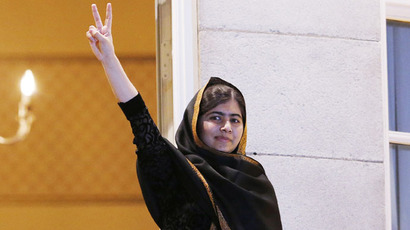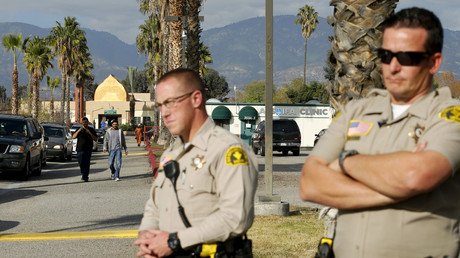Muslim teacher sues NJ school district for pattern of discrimination over her religion

A Muslim teacher in New Jersey says that she was fired because her religion causes “trouble,” and is suing for ongoing discrimination. The problems began when she showed a video of Malala ‒ the same one a white teacher used with no issues, she claims.
Sireen Hashem, a Muslim-American woman of Palestinian descent, taught US history at Hunterdon Central Regional High School in Flemington, New Jersey from 2013 until she was fired in April. She filed suit in federal court against Hunterdon County, its Board of Education, the superintendent, the high school, its principal and two teacher supervisors on Monday, Courthouse News Service reported.
Hashem claims she was unfairly singled out because of her religion, told not to "mention Islam in class" and fired "solely because of her heritage and religion," the lawsuit states.
The trouble arose shortly after Hashem started teaching at Hunterdon. As part of her continuing training, she sat in on another teacher’s history class in October 2013. That educator, Lindsay Wagner, showed a video about Malala Yousafzai, a Pakistani activist for female education who survived an assassination attempt and won the Nobel Peace Prize at age 17, becoming the youngest Nobel laureate in history.
“At the suggestion of" Watson, Hashem then showed “the same video in her U.S. history class later that day." Eleven days later, her supervisor, defendant Robert Zywicki, summoned her to a meeting and told her that Principal Susan Cooley had "received a complaint from the parent of a student about plaintiff's use of the Malala Yusufzai video during a lesson. Defendant Zywicki told plaintiff that she could not teach current events in the same manner as her non-Arab, non-Palestinian and non-Muslim colleagues," the lawsuit says.
Hashem found herself in hot water again at the end of March 2014 after being “invited to participate in an elective class where a book called ‘Lemon Tree’ was discussed” that describes a friendship between an Israeli, Dalia Ashkenazi Landau, and a Palestinian, Bashir Khariri. Hashem served as a translator for Khariri, who spoke to the students via Skype. Some parents complained about the use of the book in the elective class and about Hashem’s “participation” in it.
In May of that year, Hashem said she was unfairly singled out by the principal for using “a document-based-question commonly used by teachers throughout the United States.” It “asked students to compare the actions of John Brown at Harper's Ferry to the actions of Osama bin Laden on September 11, 2001." Again, a parent complained to Cooley about the lesson.
Cooley then told Hashem that “she should not mention Islam or the Middle East in her class. Defendant Cooley further stated that plaintiff should not bring her culture, life experience or background into the classroom."
The following school year, in September 2014, a student "posted allegations that plaintiff's brother was a terrorist on Facebook. He also posted that plaintiff was anti-Israel, was attempting to instill anti-Semitic views in students and warned that plaintiff may hurt students who did not agree with her," Hashem said in the complaint, according to Courthouse News.
In response, Hashem was paged to the principal’s office, where the teacher was “confronted” by Cooley and defendant school Superintendent Cristina Steffner, "who accused her of not sticking to the curriculum, questioned her about her teaching and how it related to the common core, accused her of discriminating against Jewish students, and also questioned her about her place of birth, her family, and her personal life."
On September 11, 2014, Hashem was again summoned by the superintendent, when she was told that she “caused trouble because she was Palestinian since the day she started working at the high school, making reference to the Malala Yusufzai video," the complaint said.
"When plaintiff countered that Lindsay Wagner used the same video and it was not a problem, defendant Steffner slammed her hand on the table and said, 'You are not Lindsay.' Unlike plaintiff, Lindsay Wagner is not Arab, not Palestinian and not Muslim," it continued.
A rabbi and several parents complained to Cooley, Steffner and the Board of Education and demanded that she be fired, "solely because of her heritage and religion."
When her new supervisor, defendant Rebecca Lucas, notified Hashem in April that she was “being let go,” Lucas told her she was being fired because "Cooley and Steffner 'wanted her gone’." By that point, Lucas had replaced Zywicki as the head of the Social Studies Department.
Students reacted with dismay at the news of her firing, starting the hashtag #FightForHashem. She had a 4.13 rating out of 5 on the Rate My Teachers website, although nine of the 10 reviews were posted after she was fired.
The pattern of discrimination didn’t stop even after Hashem was fired. She received a visit from two FBI agents in July, who told her "that they had received information that plaintiff, while at the June 15 meeting of the defendant board, stated that 'they will be sorry if she is fired.' Plaintiff denied ever making the statement. Since the defendant board was in executive session and the only people present when the plaintiff spoke were the plaintiff and the board members, this erroneous and defamatory allegation must have originated from the defendant board," she claims in the lawsuit.
Hashem is seeking relief for nine claims: Employment discrimination, disparate treatment, disparate impact, retaliation, conspiracy to discriminate, violation of her civil rights under the First Amendment, violation of her freedom of speech, denial of equal protection, and discriminatory discharge. She is asking for lost wages, compensatory damages for mental anguish and injury to her livelihood, double damages for intentional discrimination, and unspecified punitive damages.
















